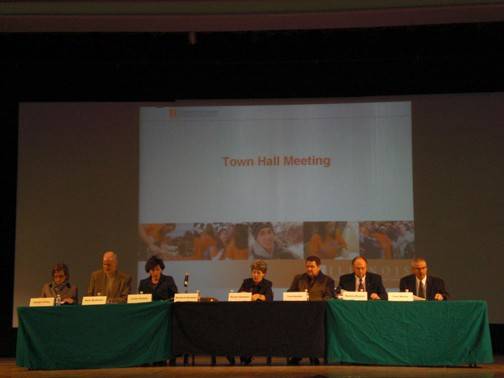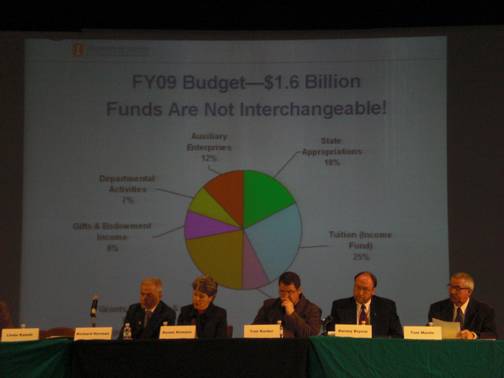 Richard Herman stressed in an optimistic tone that this is no time to adopt a mindset that “the sky is falling.” But there was much curiosity and unrest among those in attendance at the University of Illinois’ town hall meeting Thursday night.
Richard Herman stressed in an optimistic tone that this is no time to adopt a mindset that “the sky is falling.” But there was much curiosity and unrest among those in attendance at the University of Illinois’ town hall meeting Thursday night.
In an effort to provide transparency in its attempt to resolve the school’s budget shortfalls, an eight-person panel of University of Illinois representatives discussed the issue and then invited the public’s feedback. At least 500 people filled up a majority of the floor seating at Foellinger Auditorium. The crowd — a mix of university faculty, academic professionals, students and civil servants — listened to a 30-minute introduction from Chancellor Herman and Provost Linda Katehi, before the floor was opened up for more than an hour’s worth of questions from those in attendance. In addition to Herman and Katehi, the panel included Jaclyn O’Day, Student Body President; Vice President for Student Affairs, Renée Romano; and Tom Martin, President of the Staff Advisory Council. University President B. Joseph White was not present on the panel.
Using a power-point presentation as a backdrop, Herman and Katehi addressed the origins of the university’s financial woes. The state of Illinois, which is suffering from a budget shortfall of at least $2.1 billion, and the Illinois Board of Higher Education has to date called for a 2.5 percent rescission of the university’s general revenue fund appropriation. But Katehi emphasized that the university is preparing for the possibility of an additional rescission in the near future that could increase that figure to as high as 10 percent. In addition, the university’s endowment funds have taken what Herman referred to as an “enormous hit.” Katehi stressed that the university can not incur a deficit of its own.
In outlining the school’s approach to suggested cuts so far, Katehi echoed Herman’s statement that few absolute decisions had been made at this point. Each college has been asked to put aside at least 1.5 percent of its budget. However, units funded by General Revenue Funds, particularly those whose impact is not directly felt by students, will be asked to contribute a higher percentage.
 As part of her presentation, Katehi stressed that the university will adhere to a “values-guided” process when considering courses of action, in order to be “good stewards” of the institution. The Provost revealed that the university valued continued commitment to serving students, the minimization of adverse effects on “our people,” and the protection of the quality of the university’s “core programs.”
As part of her presentation, Katehi stressed that the university will adhere to a “values-guided” process when considering courses of action, in order to be “good stewards” of the institution. The Provost revealed that the university valued continued commitment to serving students, the minimization of adverse effects on “our people,” and the protection of the quality of the university’s “core programs.”
Katehi discussed the university’s plan of attack, which, in the short term, included clamping down on state-funded travel expenses and making only critical hires. As for long-term plans, the university will focus on energy conservation, improving its support of information technology on campus, and minimizing money spent on support services.
“We’re not just after survival, holding the course — therein lies the root to become less,” said Herman.
QUESTIONS TO ANSWER
The panel fielded approximately fifteen questions from a variety of perspectives, including those of union representatives, civil servants, faculty, students, and the general public.
Jay Rosenstein, a professor of journalism, asked the panel to clarify the university’s definition of its “core programs.” Herman suggested that the university will not be returning to the days when the school was known as Illinois Industrial University. Katehi indicated that the university’s core programs were the ones that “added value” and provided “basic education for students.” She specified that the designation of such programs would be left up to the individual colleges. At the conclusion of the meeting, Rosenstein indicated that he was satisfied by the panel’s response, calling it “fair.”
Dave, an employee in the UI transportation shop whose last name was obscured by mic difficulties, inquired whether the panel expected the face of the university’s work force to permanently change as a result of any resolution to the financial crisis. Herman responded with, “That’s a difficult question to give an answer to,” before discussing how the uncertainty of the state’s financial situation had prevented the school from obtaining a complete understanding of the severity of the potential cuts. Herman mentioned that there are many options on the table, including furloughs. Katehi chimed in by adding that in protecting their own people, the university hoped to institute training programs and encourage redeployment as necessary.
The heartiest applause from audience members was reserved for several representatives of the American Federation of State, County and Municipal Employees (AFSCME), who each proposed talking points during the question and answer session. Jeff Bigelow, regional director for AFSCME Council 31, pointedly declared that the university’s panel for the town hall meeting lacked the necessary diversity for a proper discussion, because it had failed to represent the significant number of AFSCME workers employed by the university.
“We appeal to you to think about that in the future,” said Bigelow. “If we’re going to be all united, then we all have to be at the table, working together to try to come to a common solution. … From AFSCME’s point of view, we are looking for solutions that do not pit the interest of students against the interest of workers. We’re not here to pit the interest of one department against another department. We’re here to find a solution that will work for all.”
Bigelow ended his statement with a request for the university to take into consideration, in his words, “the people on the bottom … the people who work to make this university work.” “We will not stand for layoffs and furloughs,” he exclaimed to much applause from the audience. Herman swiftly acknowledged Bigelow’s concerns, before moving on to the next question.
Throughout the session, Herman made several references to the state’s financial situation and political disarray as reasons why the university found itself in a position of uncertainty as to the extent of its financial limitations, and thusly its designs for resolution. When asked by audience members whether all cost-cutting measures — for example, the halting of wage increases for higher-salaried university officials and administration — were being considered, both Herman and Katehi suggested that many options were being discussed. At one point in the conversation, Herman concluded that “those who are more capable should, perhaps, contribute a little more (to cuts).”
At the conclusion of the question and answer session, a Graduate Employees Organization member asked the panel to discuss what they had learned from the evening’s discourse. Nick Burbules, chair of the university’s Senate Executive Committee and part of the town hall meeting panel, summarized the sentiment of the audience with his answer: “We’re all in this together.”
—
For more information on the University of Illinois’ budget crisis, go here.








